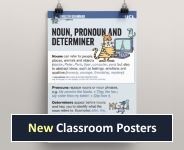Glossary
The Englicious Glossary includes the new National Curriculum glossary terms, which are shown against a white background. However, there's much more to be found here:
- we have added many entries that we feel are important, but cannot be found in the NC Glossary (e.g. connective), and
- in many cases we have added information to the (often very brief) NC entries that need further explanation (e.g. clause and phrase).
Please note that in line with our practice throughout the site, we use capital letters for function terms such as Subject, Direct Object, Indirect Object, Modifier, etc. Although this convention is not followed in the documentation published by the Department for Education we have also done so in the text that forms part of the National Curriculum Glossary.
Tip: Within our units and resources, Glossary items appear highlighted within the text. When you hover over them, or click on them in the Slideshow, a popup is generated.
question
A label for the main use (or discourse function) of an interrogative clause. For example, Will you dance with me? is an interrogative structure which can be used as a question to elicit either a ‘yes’ or ‘no’ response. Other clause types can also be used to ask questions, e.g. the declarative clause You will dance with me? This would normally be used to make a statement, but can be used as a question if it is pronounced with a rising intonation. See also clause type, command, directive, statement.
question word
A word such as who, what, why, and when used in interrogative clauses, typically to ask questions (e.g. Who called you? What did you eat for breakfast?).

